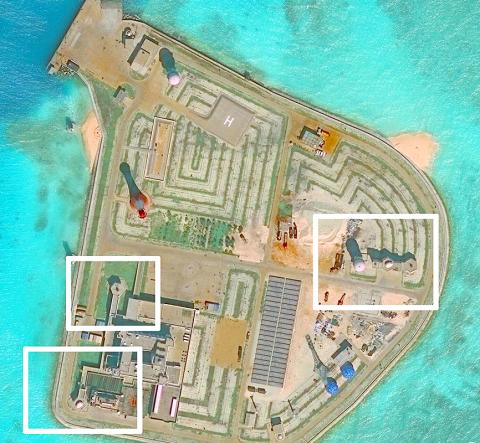China appears to be deploying weapons systems on all seven of the reefs it has reclaimed in the South China Sea, according to photographs released by a Washington-based think tank.
The Asia Maritime Transparency Initiative said it began tracking in June and July the construction of identical hexagon-shaped structures to house the weapons on Fiery Cross Reef (Yongshu Reef, 永暑島), Mischief Reef (Meiji Reef, 美濟礁) and Subi Reef (Jhubi Reef, 渚碧礁), where China has already completed military grade airstrips and installed radar.
“It now seems that these structures are an evolution of point-defense fortifications already constructed at China’s smaller facilities on Gaven [Nansyun, 南薰礁], Hughes [東門礁], Johnson [South] [Chigua Reef, 赤瓜礁] and Cuarteron [Huayang Reef, 華陽礁] reefs,” the unit of the Center for Strategic and International Studies said on its Web site.

Photo: AFP / CSIS Asia Maritime Transparency Initiative / DigitalGlobe
The installations call into question a pledge made by Chinese President Xi Jinping (習近平) not to militarize the disputed islands in the South China Sea, a US$5 trillion-a-year shipping route that the US has patrolled largely unchallenged since World War II.
China’s claims to more than 80 percent of the waters were dismissed by an international tribunal in July. Beijing said it would ignore the ruling.
US president-elect Donald Trump has cited what he said was China’s effort to build a “massive fortress” in the South China Sea as one reason for taking a more confrontational approach to relations.
He listed the project in a Fox News interview, while defending his decision to accept a telephone call from President Tsai Ing-wen (蔡英文), calling into question the US’ “one China” policy.
“I don’t know why we have to be bound by a ‘one China’ policy unless we make a deal with China having to do with other things, including trade,” Trump said in the interview broadcast on Sunday.
The think tank said that anti-aircraft guns appear to have been installed on China’s four smaller reefs. Although they cannot be definitively identified, they were likely to be close-in weapons systems (CIWS) whose function was to detect and destroy incoming missiles and enemy aircraft, the group said.
“These gun and probable CIWS emplacements show that Beijing is serious about defense of its artificial islands in case of an armed contingency in the South China Sea,” it wrote. “Among other things, they would be the last line of defense against cruise missiles launched by the United States or others against these soon-to-be-operational air bases.”

The Ministry of the Interior (MOI) is to tighten rules for candidates running for public office, requiring them to declare that they do not hold a Chinese household registration or passport, and that they possess no other foreign citizenship. The requirement was set out in a draft amendment to the Enforcement Rules of the Public Officials Election and Recall Act (公職人員選舉罷免法 ) released by the ministry on Thursday. Under the proposal, candidates would need to make the declaration when submitting their registration forms, which would be published in the official election bulletin. The move follows the removal of several elected officials who were

The Republic of China (ROC) is celebrating its 114th Double Ten National Day today, featuring military parades and a variety of performances and speeches in front of the Presidential Office in Taipei. The Taiwan Taiko Association opened the celebrations with a 100-drummer performance, including young percussionists. As per tradition, an air force Mirage 2000 fighter jet flew over the Presidential Office as a part of the performance. The Honor Guards of the ROC and its marching band also heralded in a military parade. Students from Taichung's Shin Min High School then followed with a colorful performance using floral imagery to represent Taiwan's alternate name

COVETED PRIZE: The US president would be a peace prize laureate should he persuade Xi Jinping to abandon military aggression against Taiwan, William Lai said US President Donald Trump should get the Nobel Peace Prize should he be able to convince Chinese President Xi Jinping (習近平) to abandon the use of force against Taiwan, President William Lai (賴清德) told a conservative US radio show and podcast in an interview. The US is Taiwan’s most important international backer, despite the absence of formal ties, but since Trump took office earlier this year he has not announced any new arms sales to the nation. Trump could meet Xi at the APEC summit in South Korea on Oct. 31 and Nov. 1. Lai, speaking on The Clay Travis and Buck Sexton

A Chinese takeover of Taiwan would severely threaten the national security of the US, Japan, the Philippines and other nations, while global economic losses could reach US$10 trillion, National Security Council Deputy Secretary-General Lin Fei-fan (林飛帆) wrote in an article published yesterday in Foreign Affairs. “The future of Taiwan is not merely a regional concern; it is a test of whether the international order can withstand the pressure of authoritarian expansionism,” Lin wrote in the article titled “Taiwan’s Plan for Peace Through Strength — How Investments in Resilience Can Deter Beijing.” Chinese President Xi Jinping’s (習近平) intent to take Taiwan by force